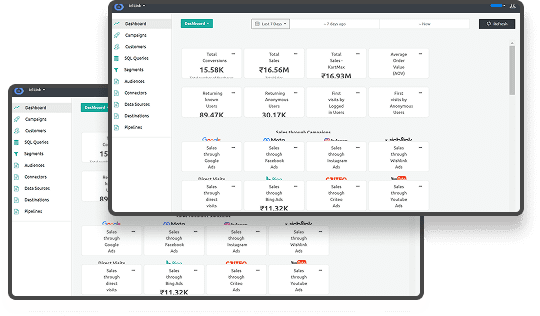Cookies are a sweet treat, but this world is now all about keeping your data sweet without them!
What is Cookieless Attribution?
As digital landscapes evolve, so does the need for advanced tracking methods. Cookieless attribution represents a forward-thinking approach to understanding user behavior without relying on traditional cookies. This technique ensures that you, as a marketer, can continue to gain valuable insights even as privacy regulations tighten and consumer preferences shift towards greater data protection.
Sreeram Khadala, a Digital Marketing Manager, says in his LinkedIn post,
“The diminishing reliance on third-party cookies necessitates adopting alternative techniques for attributing conversions and understanding user journeys.”

Cookieless attribution tracks website traffic, conversions, and marketing metrics using alternative data points, not cookies. This shift is crucial for compliance with regulations like GDPR and CCPA and adapts to the increasing trend of users blocking cookies. For businesses like those served by Ingest Labs, this means maintaining robust data insights while respecting user privacy and regulatory demands.
As we explore cookieless attribution’s functions, we will examine the innovative methods employed to ensure your marketing remains effective and compliant.
How Cookieless Attribution Works
Understanding cookieless attribution is key to adapting your marketing strategies in a privacy-first world. This approach uses innovative techniques to track user activity without storing cookies on their devices.
- Device Fingerprinting:
- Collects data like device type, screen size, and installed fonts.
- Creates a unique profile for each user based on these attributes.
- This methodology is being rendered ineffective as browsers such as Firefox, Brave, and Safari have implemented anti-fingerprinting features.
- Server-Side Tracking:
- Utilizes IP addresses and user agents to identify and track users.
- Records interactions directly on the server, bypassing the need for cookies.
- Ingest Labs’ offers consent-driven server-side tracking, a powerful solution that provides a smoother user experience without data loss and ensuring compliance to privacy laws across the world.
- With our server-side tracking platform, Ingest IQ simplifies tracking visitors on websites and mobile apps to gain valuable insights into your traffic.
- Cross-Device Tracking:
- Gather data from various devices used by a single user.
- Builds a comprehensive profile by linking data across devices.
- In today’s multi-device world, customers switch seamlessly between smartphones, tablets, and computers. Cross-device tracking allows you to recognize the same user across different devices and channels.
These methods ensure you remain compliant and effective in your data-driven strategies. With these methods, you can anticipate a future where data privacy and marketing efficacy coexist seamlessly.
Next, let’s explore the benefits this approach offers to your business.
Cookieless Attribution Methods
Understanding the various cookieless attribution methods is crucial as you navigate the shift toward a cookie-free future. These techniques ensure you can still capture essential data without compromising user privacy.
- Zero- and First-Party Data:
- Directly collect data from customer interactions on your platforms.
- Use surveys, subscription forms, and customer feedback for deeper insights.
- Contextual Advertising:
- Place ads based on the content of the web page rather than user behavior.
- Enhances relevance without infringing on privacy.
- User Identity Graphs:
- Combine identifiers from various data sources to form a unified customer view.
- Enables personalized marketing while maintaining privacy.
- Publisher-Provided Identifiers (PPIDs):
- Use encrypted identifiers provided by publishers for user tracking.
- Ensures user anonymity and data security.
- Data Clean Rooms:
- Analyze combined datasets in a secure, privacy-focused environment.
- Allows for collaboration between partners without sharing raw data.
- AI-Driven Attribution:
- Employ AI to integrate and analyze data in real time.
- Provides dynamic ad delivery based on current data inputs.
These cookieless attribution methods not only comply with stringent privacy laws but also allow for more respectful and effective marketing practices.
With these methods, you can anticipate a future where data privacy and marketing efficacy coexist seamlessly.
Now, let’s explore the benefits this approach offers to your business.
Benefits of Cookieless Attribution
Cookieless attribution offers significant advantages for your marketing strategies, aligning with privacy standards and operational effectiveness.
- Enhanced User Privacy:
- Respects user preferences for privacy by not relying on invasive cookies.
- Build trust with your audience, enhancing brand reputation.
- Future-Proofing Data Collection:
- Prepare your marketing practices for the future without third-party cookies.
- Ensures sustainability as browsers phase out cookie support.
- Improved Data Accuracy:
- Overcomes limitations associated with third-party cookies, like data loss and blocking.
- Provides more reliable and stable insights.
- Regulatory Compliance:
- Aligns with global privacy laws such as GDPR and CCPA and ensures user consent.
- Reduces the risk of legal issues and fines.
- With Ingest IQ, you can keep customer data secure and comply with privacy regulations while gaining valuable insights into your traffic with our server-side tracking platform.
As we continue to adapt to these changes, understanding the challenges and limitations of this approach will be vital for further refinement. Let’s explore those next.
Challenges and Limitations
While cookieless attribution marks a significant advancement in digital marketing, it comes with challenges and limitations that need careful consideration.
- Data Accuracy:
- Cookieless attribution may result in less precise data than traditional methods.
- Adjustments are needed to maintain data quality and reliability.
- Limited Standardization:
- The industry lacks uniform standards for cookieless tracking.
- This can lead to inconsistencies in data collection and analysis.
- Ingest IQ promotes consistent tag naming conventions within your infrastructure, minimizing errors caused by inconsistencies and typos.
- Technical Complexities:
- Setting up cookieless tracking systems involves complex configurations. Read how Ingest Labs empowers you to integrate with your existing tech stack seamlessly.
- Requires significant technical expertise and resources.
- Adoption of New Models:
- Businesses may be hesitant to shift from familiar cookie-based methods.
- Educational efforts and demonstrations of value are necessary to encourage transition.
As you navigate these complexities, staying informed and agile will be key.
Now, let’s understand the importance of embracing cookieless attribution in light of stricter privacy regulations and changing user behaviors.
The Importance of Cookieless Attribution
In today’s rapidly changing digital landscape, cookieless attribution becomes crucial for maintaining robust marketing strategies while respecting user privacy.
- Compliance with Stricter Privacy Laws:
- Cookieless attribution ensures adherence to GDPR, CCPA, and other privacy regulations.
- It helps avoid penalties and builds trust with your audience.
- Ingest Labs provides all its services to the GDPR and CCPA.
- User Adoption Increase
- More internet users are blocking cookies, reducing the effectiveness of traditional tracking.
- Cookieless methods meet these privacy preferences, maintaining data collection capabilities.
As we move forward, it’s essential to continuously explore new methods and technologies that enhance cookieless attribution and ensure it meets both business needs and regulatory demands. So, let’s look at future considerations and recommendations next.
Future Considerations and Recommendations
As digital marketing evolves, staying ahead with cookieless attribution strategies is essential. Here’s what you need to consider for future success.
- Experimentation and Adaptability:
- Continuously test and refine cookieless attribution methods to find what works best.
- Stay flexible and adapt to new technologies and methodologies as they emerge.
- Privacy as Priority:
- Ensure all attribution methods comply with the latest privacy laws and user expectations.
- Build and maintain trust by being transparent about your data use practices.
- Resource Planning:
- Allocate adequate resources for cookieless attribution initiatives, including budget and skilled personnel.
- Invest in training for your team to keep them updated on best practices.
By investing in these areas, you ensure that your marketing efforts are both practical and ethical.
With these strategies in place, your business is well-prepared to tackle the challenges and leverage the opportunities presented by the evolving digital marketing landscape.
Conclusion
Cookieless attribution is not just an alternative to traditional tracking methods; it's the future of respectful, effective digital marketing. By adopting these practices, you align with global privacy standards and enhance your customers' trust in your brand. As third-party cookies phase out, it ensures you don't just survive but thrive in the evolving digital landscape.
At Ingest Labs, we understand cookieless attribution's critical role in modern marketing strategies. Our cutting-edge solutions are designed to help you transition smoothly and successfully, ensuring you continue gathering vital insights without compromising user privacy. Ready to future-proof your marketing efforts? Contact us today to learn how our tools can empower your campaigns.






